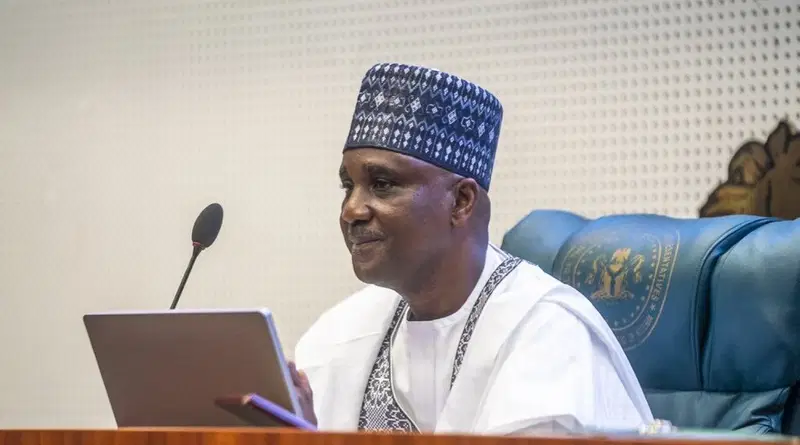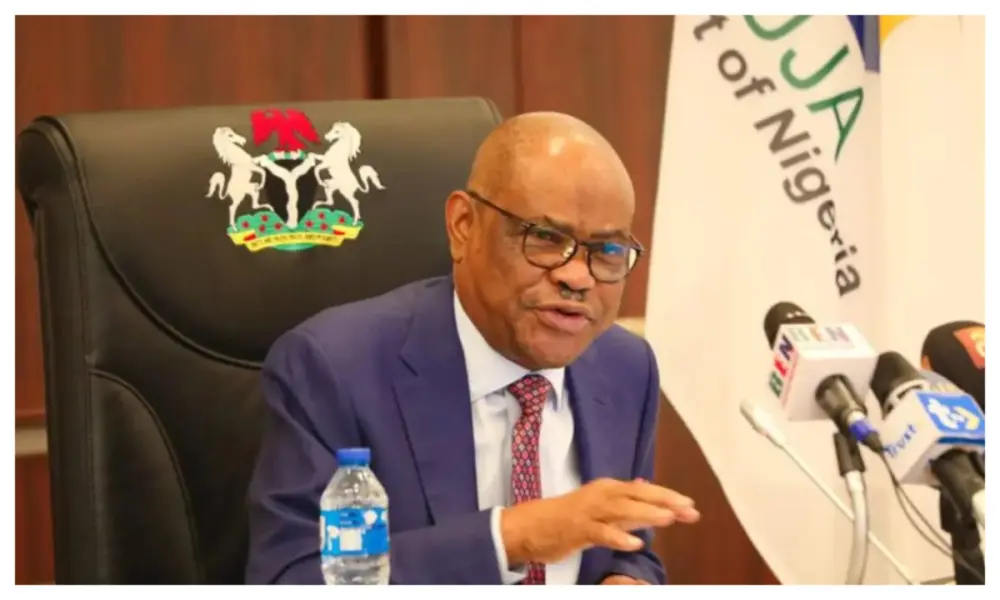The Speaker of the House of Representatives, Hon. Abbas Tajudeen has said Nigeria is assuming a continental leadership role in the race to electrify Africa, with a bold target to help provide electricity to 300 million Africans by the year 2030.
The Speaker has also praised President Bola Tinubu’s approval of a $1 billion financing initiative for the Rural Electrification Agency in December 2024.
Abbas spoke while delivering the keynote address at the opening of the First Legislative Conference and Expo on Renewable Energy organized by the House of Representatives Committee on Renewable Energy, chaired by Hon Afam Ogene, in collaboration with the United Nations Development Programme (UNDP), in Lagos on Monday.
According to him, Nigeria’s involvement in the Mission 300 Initiative, a collaborative effort with the World Bank and the African Development Bank, exemplifies its commitment to advancing clean and inclusive energy access across Africa.
Abbas said this initiative is a strong demonstration of Nigeria’s leadership on the continental stage.
“On the continental stage, Nigeria has assumed a leadership role. Through our participation in the Mission 300 Initiative with the World Bank and the African Development Bank, we are working to provide electricity to three hundred million Africans by 2030.
“While progress has been made, the road ahead requires sustained effort. The success of this transition depends on coherent actions across all institutions. Legislators must establish sound legal foundations. The executive must implement with integrity and urgency. The private sector must invest in innovation and scale. Civil society must foster awareness, inclusion and accountability. This conference, therefore, provides an opportunity to reaffirm our shared commitment,” he said.
Abbas urged that the momentum built so far should not be allowed to dissipate and urged that the resolutions should lead to concrete outcomes, including model legislation, greater investments, and the adoption of new technologies.
The Speaker used the platform to reaffirm Nigeria’s internal strides toward a clean energy transition. He highlighted the legislative reforms championed by the 10th House of Representatives, including the recent establishment of a Standing Committee on Renewable Energy, which coordinates national efforts in expanding access to clean power.
“Our legislative agenda recognizes energy reform as central to our national priorities. Strategic Objective 8.5 aims to promote renewable energy development while ensuring access, efficiency, and environmental responsibility,” he said.
Among recent legislative milestones, he cited the House’s passage of new tax reform bills that eliminate Value Added Tax (VAT) on renewable energy components and Compressed Natural Gas (CNG) technologies. These reforms, he said, are designed to stimulate private investment and enhance affordability in the clean energy sector.
He said the House is also working to provide legal backing for Nigeria’s Renewable Energy and Energy Efficiency Policy (REEEP) of 2015, a framework that seeks to boost renewable energy adoption, curb greenhouse gas emissions, and improve energy efficiency nationwide.
Speaker Abbas noted that the urgency to transition to clean energy is no longer optional, citing global energy trends that show a decisive shift toward renewables. He noted that in 2024, renewable energy accounted for over 92 percent of new global power generation capacity, driven primarily by solar and wind, bringing the world’s total installed capacity to over 4,448 gigawatts, a 15% year-on-year increase.
He also referenced international investment figures from 2023, where $1.7 trillion of the $2.8 trillion total global energy investment was directed toward renewable energy, energy efficiency, and electric mobility.
“This is a structural reorientation of the global energy economy,” Abbas said. “Nigeria must align with this reality to stay relevant, competitive, and environmentally responsible.”
He pointed to legislative successes in countries such as Egypt, Germany, and members of the European Union, where robust legal frameworks have accelerated clean energy expansion. He called for African parliaments to emulate such examples through strong laws, decentralized energy strategies, and support for independent power producers.
Speaker Abbas commended the Tinubu administration for key energy policy reforms, particularly the Electricity Act of 2023, which devolved control over the power sector to sub-national governments, thus encouraging localized energy solutions and private-sector participation.
He said of the $1 billion approved by the President Tinubu, $750 million is earmarked for expanding solar access in underserved areas, resulting in the deployment of 124 mini-grids and over 25,000 solar home systems, benefiting more than 200,000 Nigerians.
“Such bold investments are game-changers,” the Speaker said. “They show what is possible when policy, financing, and legislation align.”
The Speaker reiterated Nigeria’s commitment to its Energy Transition Plan, which lays out a path to achieving net-zero emissions by 2060. He also welcomed the launch of the Nigeria Carbon Market Activation Policy in March 2025, aimed at unlocking climate finance and enhancing project viability.
He emphasized that legislative support, policy innovation, and private-sector engagement are all required for the success of Nigeria’s green transition.
Abbas said that legislators must enact and enforce strong legal foundations, while the executive branch must implement these policies with urgency and integrity.
“The private sector must invest boldly, and civil society must foster awareness, inclusion, and accountability,” he added.
He urged participants to take full advantage of the conference to develop concrete resolutions, model legislation, and partnerships that will deliver tangible results.
Let us not lose the momentum we’ve built,” Abbas said. “Let this conference be remembered not just for the conversations it sparked but for the change it inspired,” he said.
Speaker Abbas underscored the importance of continental collaboration. He lauded the participation of fellow African parliamentarians and emphasized the value of cross-country learning in strengthening regional capacity for renewable energy development.
Chairman of the House Committee on Renewable Energy, Hon. Afam Victor Ogene, called for urgent action.
He emphasized that Nigeria’s continued reliance on fossil fuels, despite its vast reserves, has failed to provide reliable electricity, stifling economic growth and productivity.
Ogene acknowledged that while fossil fuels are vital to the economy, the country must diversify its energy sources to ensure sustainability and reduce dependence on non-renewable resources.
The persistent power supply challenges we face are not just a technical issue, they are a barrier to our national development. To move forward, we must embrace renewable energy as a critical component of our energy strategy,” he said.
Highlighting the importance of legislative action, Ogene pointed to the House’s recent steps to ensure government agencies transition to renewable energy sources for their operations.
He also revealed that the Committee had launched investigations into the management of past renewable energy investments, emphasizing the need for accountability and transparency in future projects.
“The transition to renewable energy is not just about power generation; it’s about creating economic opportunities, especially for our youth. Every solar panel and clean energy initiative represents potential jobs and skills development,” Ogene added.
Speaker of the Parliament of Ghana, Hon Alban Sumana Kingsford Bagbin, said the Conference was not just a testimony to the increasing urgency to address energy challenges, but also a call to policymakers, legislators, investors, community and innovators to take action towards shaping a sustainable energy future.
Represented by Ghana’s First Deputy Speaker of Parliament, Hon. Bernard Ahiafor, he called on African legislators to play a central role in driving the continent’s transition to renewable energy, emphasizing that sustainable energy is vital for Africa’s development and climate goals.
Ahiafor applauded Nigeria’s efforts in convening stakeholders to identify legislative and policy gaps in the renewable energy sector. He stressed the need for inclusive policies that attract investment, expand energy access, and support local industries.
Citing global data from the International Renewable Energy Agency (IRENA), he noted that over 80% of new electricity capacity in 2023 came from renewable sources, signaling the rapid pace of the global energy transition.
However, he cautioned that Africa remains underpowered, with more than 600 million people still without access to electricity despite holding 60% of the world’s best solar resources.
He spotlighted Ghana’s progress in the sector, including utility-scale projects like the 50MW solar PV farm and the sub-region’s first floating solar plant.
He also highlighted Ghana’s off-grid initiatives and favorable policies like net metering, tax incentives, and green financing through programs such as SUNREF and the Green Climate Fund.
Ahiafor emphasized the importance of legislative backing in energy reform, referencing Ghana’s Renewable Energy Act and other key laws.
He also reiterated Ghana’s commitment to international agreements like the Paris Accord and Sustainable Energy for All.
He urged African nations to work collaboratively across borders to power homes, schools, and industries with clean, affordable energy, stressing that a just and inclusive transition is essential to ensure no community is left behind.
The UNDP Resident Representative, Ms. Elsie Atafuah, said the cost of inaction was too high.
She said the world is reorganizing around energy, minerals, and climate security, adding that the next superpowers will be those who master the green value chain.
Atafuah said Nigeria has the people, the resources, and the influence to lead but leadership requires courage, vision, and legislative action.
She said today, the world stands at a critical moment with rising planetary challenges such as climate change, pollution, and biodiversity stress geopolitical realignments. amidst even more significant
Atafuah said this is a defining moment for Nigeria’s development journey, where energy is not only a development necessity but a cornerstone of economic competitiveness, national security, and global positioning.
She said as countries across Africa and around the world make bold strides to secure their energy futures and critical mineral assets, the choices Nigeria makes today will shape its trajectory for decades to come.
She said UNDP and the United Nations stand ready to support, through scalable solutions, policy design, technical assistance, financing models, and strategic partnerships.
She urged that the Conference should mark the deepening of Nigeria’s energy and mineral economy, clean, competitive, and globally relevant.



